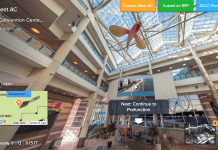
5G is coming to a city near you—and eventually to the hotels and convention center, too.
While the full impact of 5G will not likely be felt for a few years, it has arrived in some big cities (among them Atlanta, Dallas, Houston, Indianapolis, Los Angeles and Orlando), and it’s potentially 1,000 times faster than 4G. In Europe, Monaco just became the first country to roll out full 5G coverage. The question is: What do meeting planners need to know—or do—right now?
For those living in the heart of the tech universe—attendees at the Consumer Electronics Show—the buzz at this year’s show in January was all about 5G. Smartphone prototypes. Demos from leaders in the field, such as Qualcomm, Intel and Verizon.
At AT&T Stadium, the first stadium in the country to introduce 5G, AT&T customers use more than 155 TB of mobile data a year (the equivalent of sending about 400 million selfies). Eventually, it will do much more than just speed up their ability to share videos of the games via their smartphones. Ultimately, they might be able to participate in the victory celebrations going on in the locker room through VR glasses hooked up to their phones, or watch instant replays in 360-degree video.
5G will extend the capabilities of meeting apps, too. App provider Eventbase offered some possibilities on its blog: Conference apps might be used to re-order refreshments or instantly sharing meeting experiences on social media. Apps will instantly recognize attendee locations, making it easy to customize the experience by adding personal recommendations. “Perhaps after guiding your attendee to a session based on their interests and seating them next to someone they’ve expressed interest in meeting, your event app can offer them a nearby lunch recommendation,” they suggested.
“We see it as the potential to establish a seamless platform that enables things like hologram-based keynotes that generate increased audience engagement; real time analytics that allow us to instantly understand and adjust trade fair promotions that attract more attendees; and streaming AR to mobile devices as a way to make presentation graphics more meaningful,” Juliano Lissoni, managing director, MCI Canada Ltd., told PCMA.
In China, Shenzhen Telecom and Huawei signed a strategic cooperation agreement in April to create the world’s first 5G smart hotel, but the first facilities to be fully wired will be the large ones. For example, The Los Angeles Convention Center became the first convention center in the United States to permanently install a 5G wireless network, which was deployed last fall for the GSMA Mobile World Congress Americas.
For meeting planners, the impact of 5G will depend on the nature and size of their events. Stay tuned.










